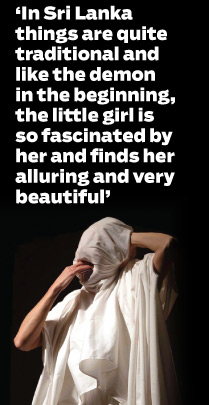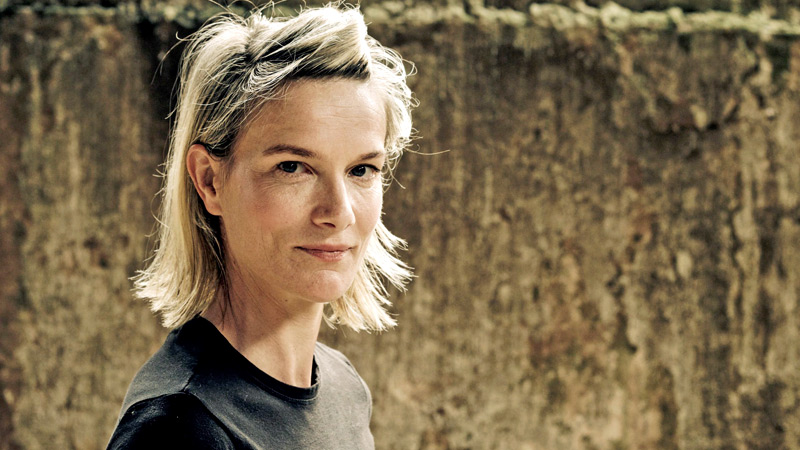 Her stage presence was profound; Violet an inimitable character was brought to life with such skill and authenticity, that we the audience could only gawk in amazement at the talent of this actress whose energy and persona reverberated through the entire theatre.
Her stage presence was profound; Violet an inimitable character was brought to life with such skill and authenticity, that we the audience could only gawk in amazement at the talent of this actress whose energy and persona reverberated through the entire theatre.
Born in Uganda, Jessica obtained her honours degree from the University of Cape Town and has been working on theatre, cinema and television since 2002.
She got many starring roles in various South African television series, until her breakthrough role came in the film Disgrace, a film adaptation of J.M Cotzee’s book, starring opposite John Malkovich and directed by Steve Jacobs.
The acclaimed starring role launched Jessica’s career globally and resulted in many international projects, while writing and producing much of her own work for theatre and television. Jessica has studied shadow puppetry at ‘Theatre-der-Schatten’ in Germany and is well-versed in clowning and physical theatre and has danced professionally with a qualification in Cecchetti Ballet. Observer Muse met with Jessica to discuss more about her play and future plans.
Q: Can you tell us about the character you play? What inspired you to write this role?
A: Violet, she’s got quite a whimsical name because I wanted it to be generic and global and Violet’s character is quite fantastical, it’s not real but I drew from a lot of personal experiences. I went to boarding school and I was at a ballet school for a long time and I have suffered as a victim of eating disorders which I overcame. Just like Swash was saying in the beginning it’s about pop culture constructs and this desire to be perfect, children are exposed to so many images on how to behave and how to look a certain way, so I like to think of her as an archetype.
I’m hoping that everyone can connect with her in some way. It’s a character I created to represent young girls.
Q: How did you approach building your character? Was it a personal experience?
A: Yes, the journey of Violet is a very personal one. I went to boarding school and dyslexic, I had to really work at my studies. I think that’s where the honesty of the character comes from. It’s wonderful because you’re being given a character you can draw from very personal reference and experience.
Q: What was the challenging aspect of portraying your character on stage?
A: I think the physicality of it. I have to really remind myself to slow down and breathe, also melding the technical with the story. I think it took me a long time to work the two together, because my technical brain is going, oh, I need to move this. And if I move a light this much forward, then the shadow’s off. So trying to merge those two was the biggest challenge and the energy, trying to pace myself.
Q: How do you think the play will resonate with modern audiences? Do you see any parallels to current events or society?
A: I like to think the notion of boarding school and rigid education is still in flux. I think education is becoming much more holistic, but in Sri Lanka things are quite traditional and like the demon in the beginning, the little girl is so fascinated by her and finds her alluring and very beautiful.
She represents social media, all the things that the youth are bombarded with how to look a certain way. The demon grows up in character, she is a very sinister thread that feeds throughout her life and in the beginning she finds it very alluring but as she gets older she realises that it’s the negative mind, fear or self-doubt questioning everything.
She starts off as this young girl who’s very naive and free and then she goes out into the world and she’s judged and she’s told that she’s not good enough, not pretty enough and ponders maybe I don’t fit in. She ends up with mental health issues which she eventually overcomes.
Q: Is there a particular moment in the play that you find especially meaningful or emotional?
A: I think what I find very emotional is that I’ve lived away from home for a long time. We’ve moved around a lot. In the beginning a house that’s covered in cloths represents that and at the end she goes full circle she comes back to the same house that she started at and she brings her family back home to Africa. I think I get quite nostalgic and sad I really feel like I’m coming home because I’ve been away from home for so long.
Q: How long have you been away?
A: Sixteen years from Africa, I have been living three- and-a-half years in Sri Lanka. But yeah, Africa has always has this pull in the heart string. This yearning and longing to always go back to Africa, feel the trees and the sunshine.
Q:Have you learned anything new about yourself through this role and production?
A: Gosh, I think I’ve learned the power of friends. I could never have done this without two incredible women, Swasha and Alia. Because I was on this big mission to do a play on my own but I’ve realized art is an ensemble.
Alia and Swasha said, you cannot do this on your own and it really humbled me. They’ve just been so incredibly generous with their time; I could never have done this without them. So that has been an incredible learning curve for me, to wear multiple hats. I’m an actor but I’ve never had to produce and orchestrate it and do all the marketing side. That’s been quite tough because often sometimes you feel like it’s stamping all over the creativity but these two women have been amazing. They’ve really looked after all that.
Q: What’s next for you after this production? Do you have any upcoming projects?
A: I think now that I have found a vehicle of storytelling in light and shadow, I’m fascinated by the things I can do, I’d love to do some workshops with some Sri Lankan artists and young children and teach them the craft of shadows because I think it’s very evocative and beautiful and it transcends language, regardless whether you speak Tamil, Sinhala or English, you can use shadows and light to say so much.
You can speak Gibberish, but the visuals will say so much, as well as the art of clowning and mimes. I don’t think many such plays like this have been done in Sri Lanka, so I’d love to hold some workshops here.
Alia, Swasha and myself have started a tiny production company called Alokaya Oli Productions. It means light in Sinhala and Tamil, and we hope to collaborate with other local artists. But I also love the art of satire, something that’s quite serious but light, so that’s where I’d like to go next, we’ll see.




